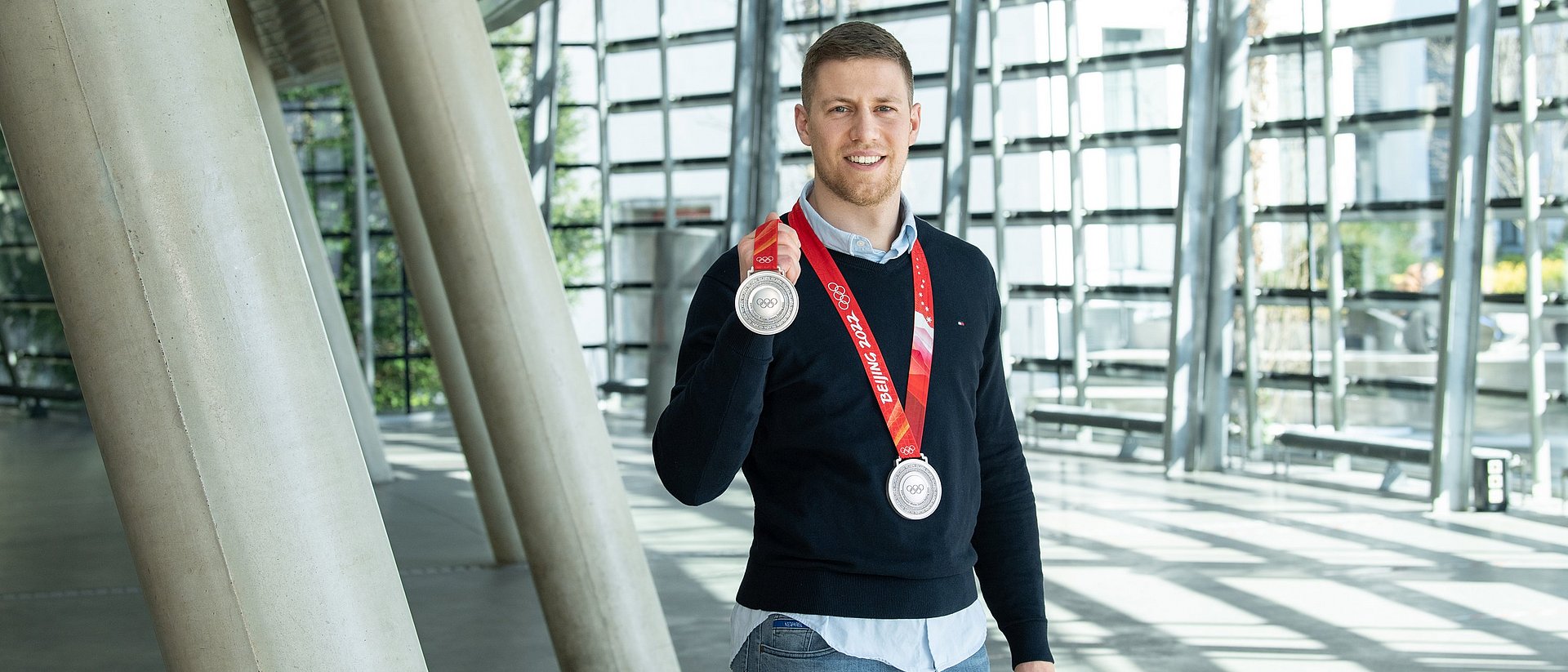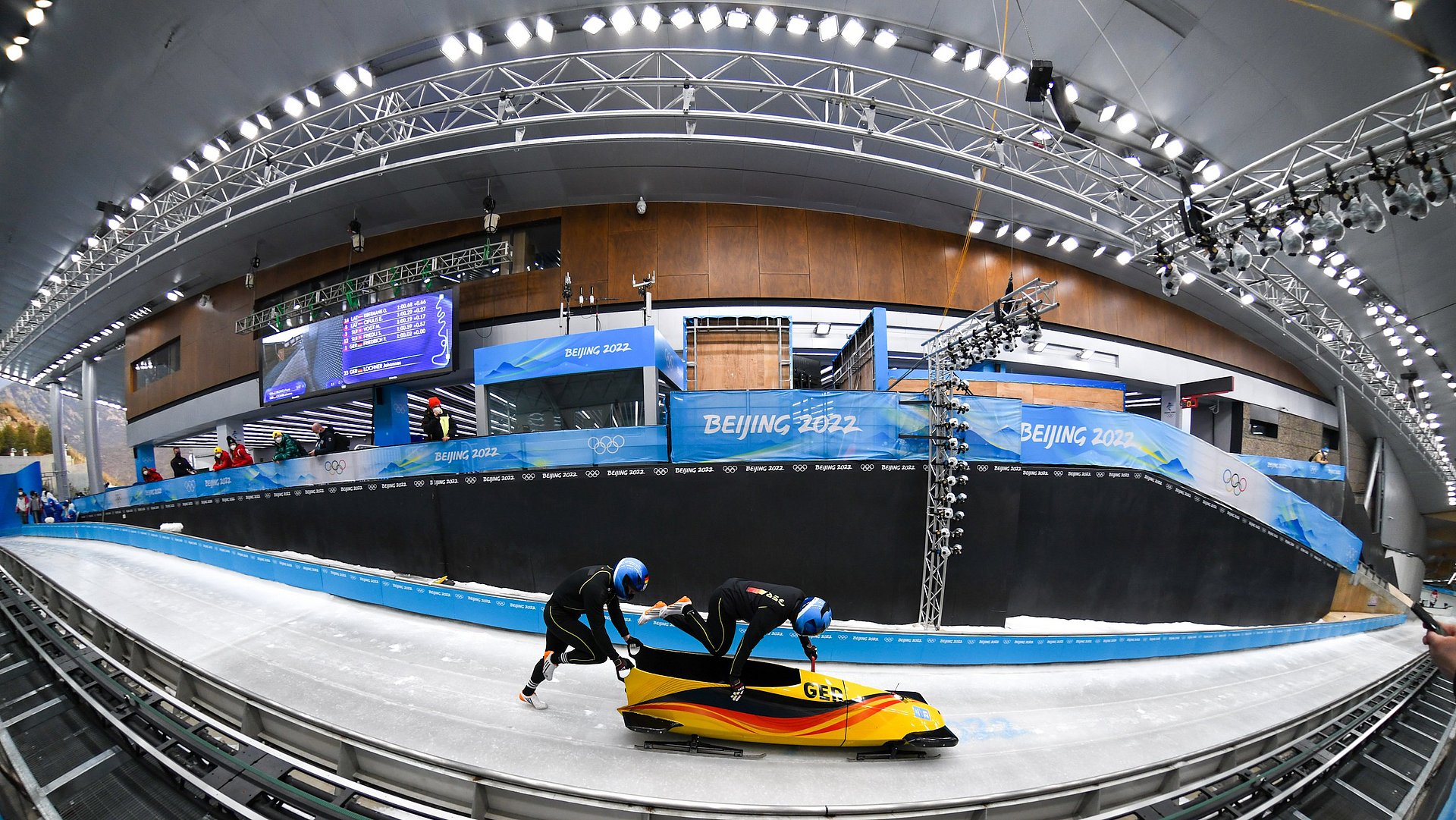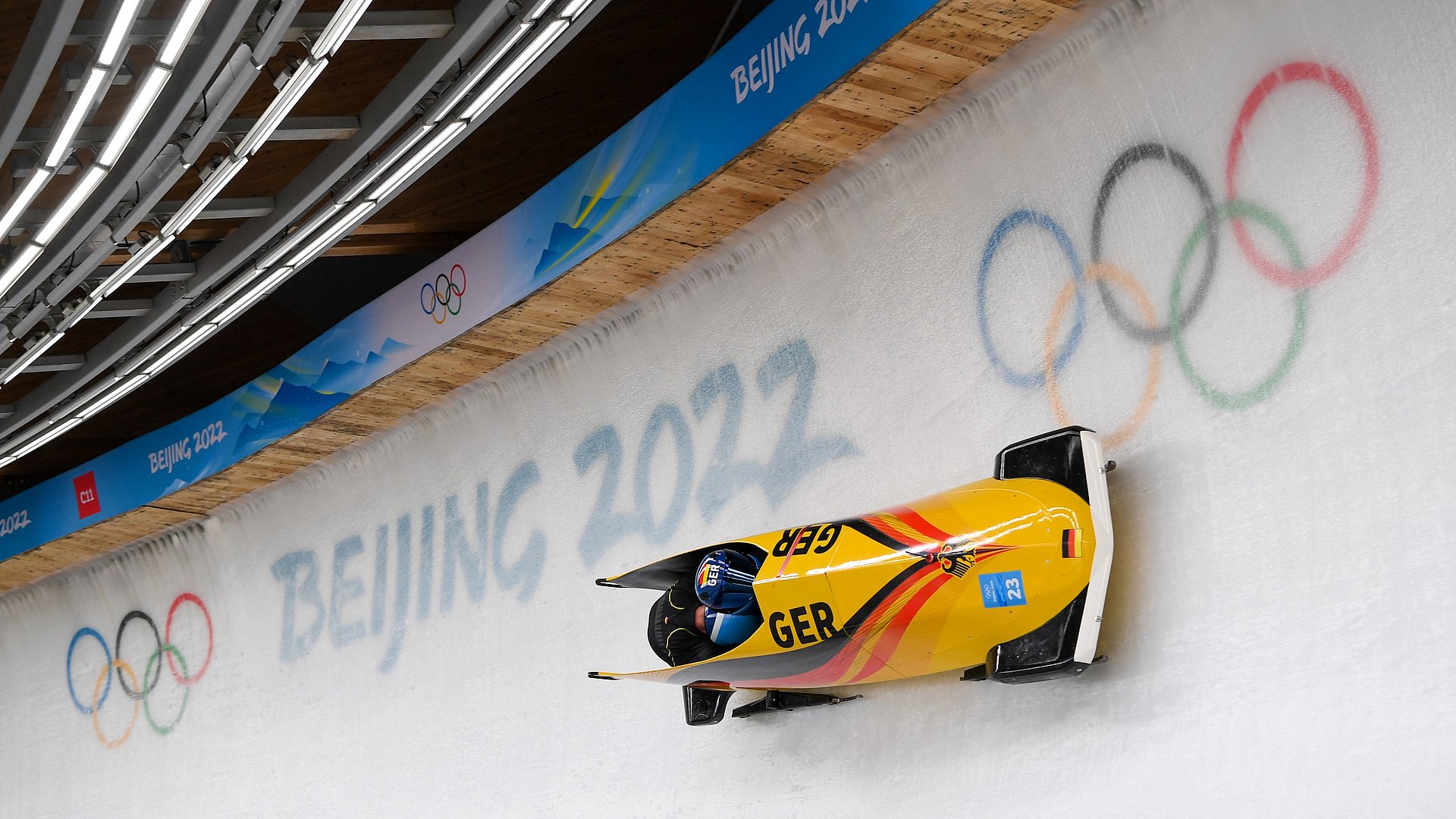Two Olympic silver medals for TUM student Florian Bauer
“Like a roller coaster, but with your eyes shut and no seatbelt”

You began your studies in Civil Engineering in 2014 and started bobsledding in 2015. What is it about this sport that makes the double workload worthwhile for you?
First, it’s of course the success that keeps me going right now. Without that, it’s just hard to stay motivated. But almost more important is the fact that bobsledding is a team sport – even more so in the four-man than the two-man sled. That’s a lot of fun. And I’m also tinkering and trying things out all the time with the equipment. Just trying to tease out another hundredth of a second here and there.
Is that really all?
Well, of course there’s also the big adrenaline surge. It’s like riding a roller coaster with your eyes shut and no seatbelt – but even crazier. That’s bobsledding.
How did you prepare for the Olympic Games in Beijing? What was life like over the past few months?
Our normal season starts in October with the first runs. In October 2021 we had already been in Beijing for three weeks. Just to start familiarizing ourselves with the track so we wouldn’t be starting from scratch at the Games. At the end of November, the tightly scheduled World Cup started, with one event after another. We were still racing two weeks before we flew to China. I spent a week at home and then we went to a sort of quarantine training camp to rule out the possibility of a positive test shortly before departure. And then we left for China at the end of January.
The athletes’ hopes and fears as they waited anxiously for the next test result – that was probably quite stressful.
That was probably one of the worst things. It was with you all the time. Until our departure in Frankfurt, with everyone on board, knowing that they had cleared the biggest hurdle – and that we’d all be negative on arrival.
The host country was already the subject of heated debate in the run-up to the Games, with several countries boycotting the Games politically. What role did that play for you, including during your preparations?
We know at least four years in advance where the games are taking place. So we were prepared. Naturally I have a rough idea of the situation in China. So it’s certainly not ideal. But in the end, we were there as athletes. For almost everyone, it’s their career. We all actually tried to block that out and say: “Okay, we’re going there. But we’re there to compete and hopefully to win a medal. And that’s our focus.”
What were your impressions of China and the people there?
I travelled in a bubble. I arrived in a separate terminal and only saw the fully masked volunteers and customs agents. After that I hardly saw any Chinese people. Our bus followed a police escort through closed-off streets to the hotel. From that point, I only went back and forth between our accommodation and the bobsledding track. The few Chinese people I dealt with were all very nice and helpful.
That sounds a little sad.
Well, at the events there was a little bit of Olympic spirit. And at meals I talked with a few Canadians and Americans and stood around with athletes from a couple of other countries at the track. And there were 20 or 30 more cameras at the starting line than at other competitions. For me that was another reminder of the sheer scale of this sporting event.
In the team with pilot Johannes Lochner, you’re the “pusher”. What does your role involve?
As a pusher, my role is indeed to push the bobsled, which means giving it as much acceleration as possible for the start. That’s the only way to make sure the pilot enters the track with as much speed as possible and make a clean run to the bottom. When I’m sitting in the two-man or four-man sled, there’s not much left for me to do after that. I just try to be as aerodynamic as possible.

How do you become a pusher?
Bobsled pushers generally have a background in some kind of feeder sport. People start out with bobsledding fairly late, generally no younger than 18. We have a minimum age of 16 in our discipline. That’s because the spine needs to be fully developed due to the centrifugal forces in the curves. I did athletics and competed in 100 and 200 meter sprints. Another sprinter who was invited to try out as a bobsled pilot asked me if I wanted to give pushing a try. So I went to Berchtesgaden for a tryout. They said that I was looking pretty good and I should stick with it. That was six years ago.
A lot has happened since then. What does your weekly training routine look like?
Bobsled training doesn’t differ very much from athletics training, or sprint training. For me, that was definitely an advantage. To make the transition from sprinter to pusher, I just had to build up some weight. So there was a little more strength training and a little less sprint training. And we do a few other things like yoga and stretching sessions. That pretty much fills up the week.
One almost forgets that you’re also studying. What kind of support did you get from TUM en route to two Olympic silver medals?
My point of contact at TUM is Prof. Dr.-Ing. Stephan Freudenstein, a professor at the TUM School of Engineering and Design. At the start of the semester we draw up a strategic plan: What will I do? What won’t I do? And what actually makes sense? The biggest accommodation on the part of TUM is with the holiday semesters: I can take as many as I want.
Otherwise it would hardly be possible.
Over the past four years it was huge. From October to March I’m busy and on the road 24/7. That makes it very difficult to do anything for university. Sometimes, when I’m lucky, I can write a couple of exams in March. But actually my studies tend to take place in the summer. Sometimes I have up to eight exams at once.
So your schedule is jam-packed every summer, too, and not just in the winter.
That’s right. But even if it bothers me sometimes how long my studies are taking: dropping out was never an option. This persistence is another thing I’ve learned through competitive sports. I just accept that it’s going to take longer for me than for the others. And I’ve learned to live with that over time.

- At the Winter Olympic Games, the German two-man teams earned the first podium sweep in Olympic bobsleigh history.
- Florian Bauer’s pilot in the two-man and four-man sleighs is Johannes Lochner, who completed a master’s degree in Electrical engineering at TUM in 2021.
- Bauer is a member of BRC Ohlstadt near Garmisch-Partenkirchen, but does most of his training in Munich.
- In the coming weeks, Bauer – who is part of the German armed forces sports program – is invited to meet minister of defense Christine Lambrecht in Berlin.
- Florian Bauer's profile at the International Bobsleigh & Skeleton Foundation
Technical University of Munich
Corporate Communications Center
- Katharina Horban / Verena Meinecke
- presse@tum.de
- Teamwebsite